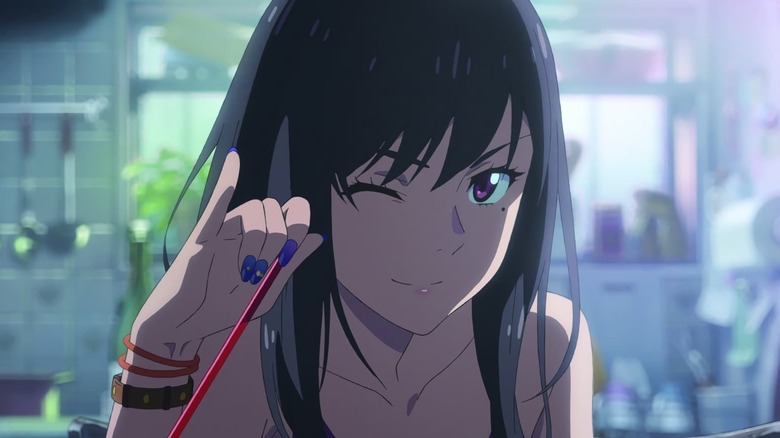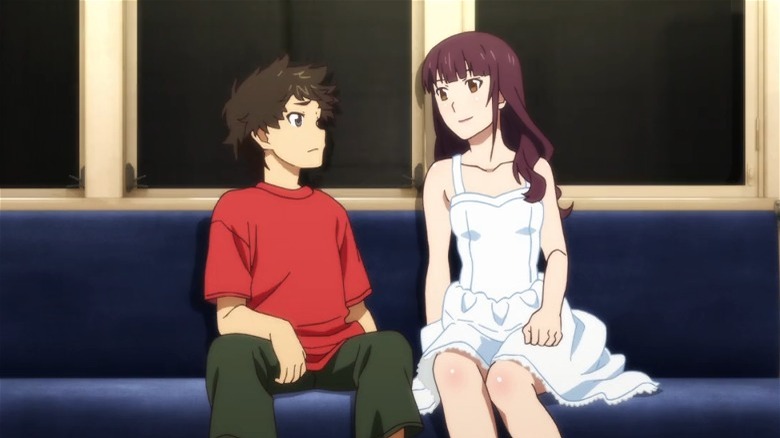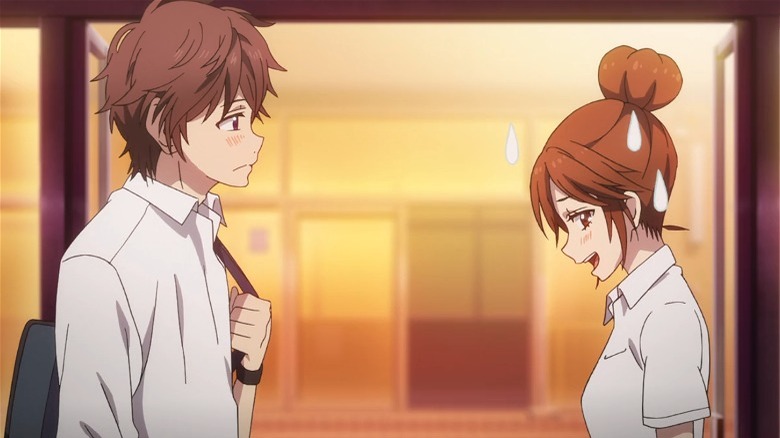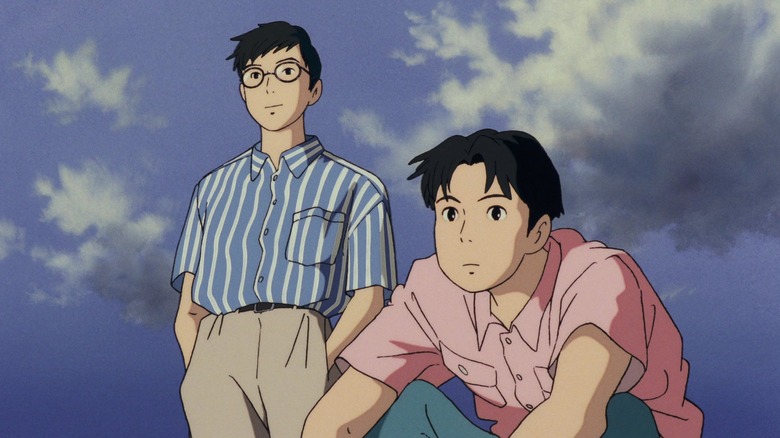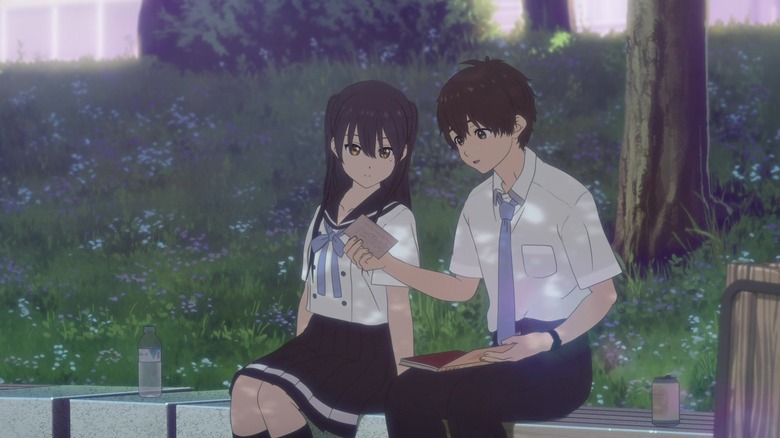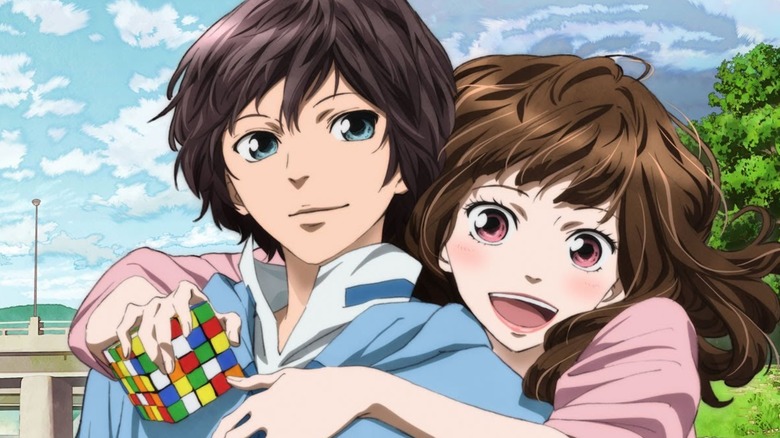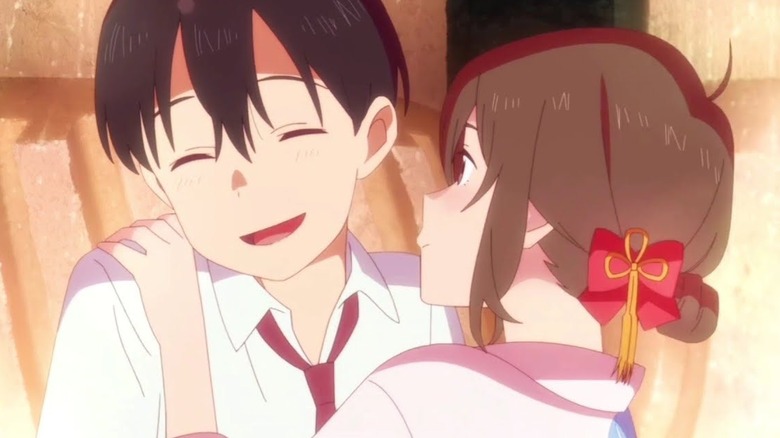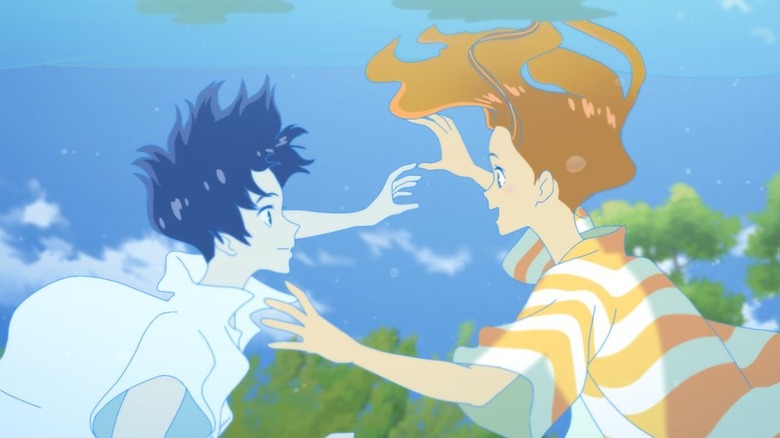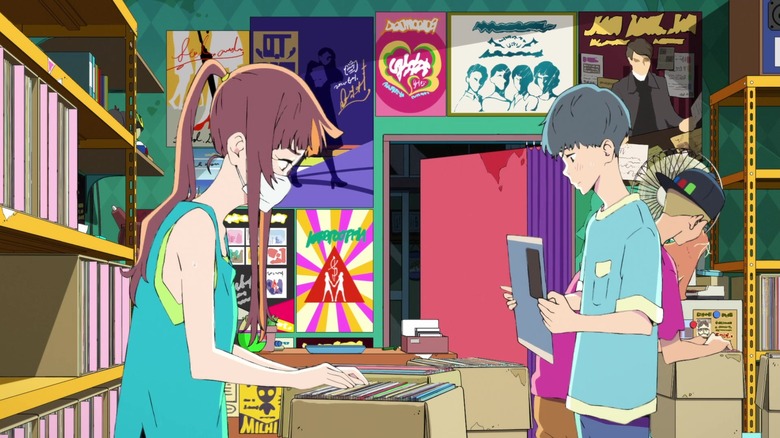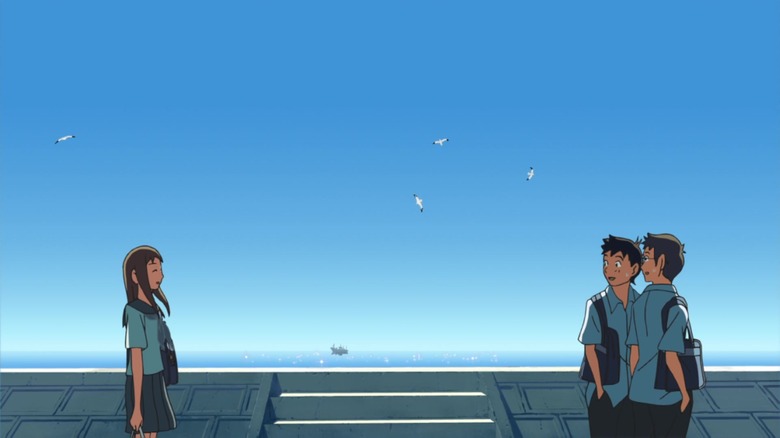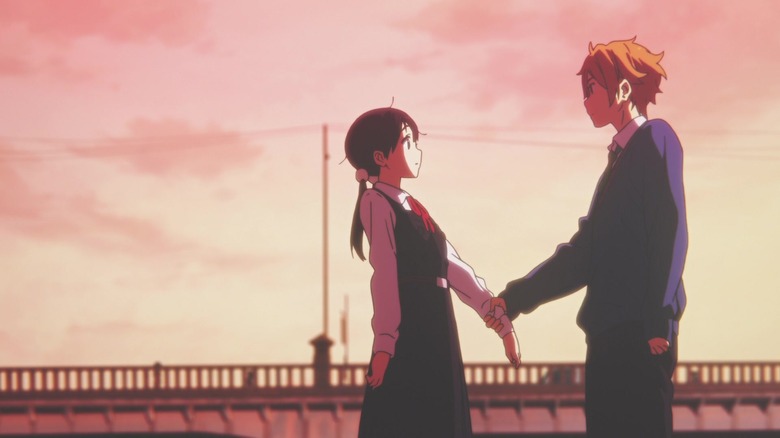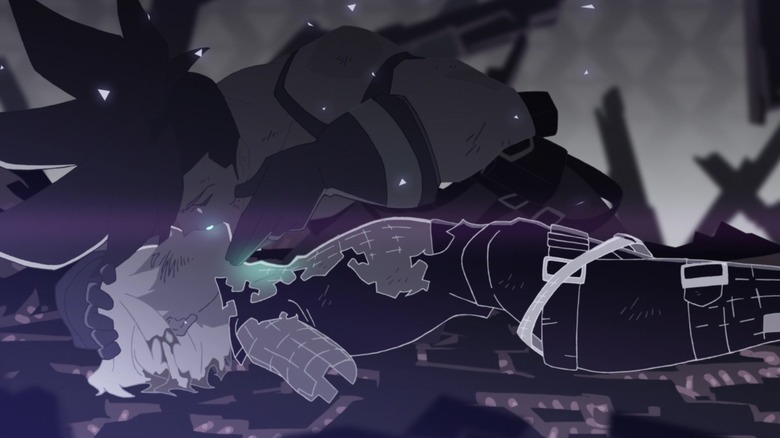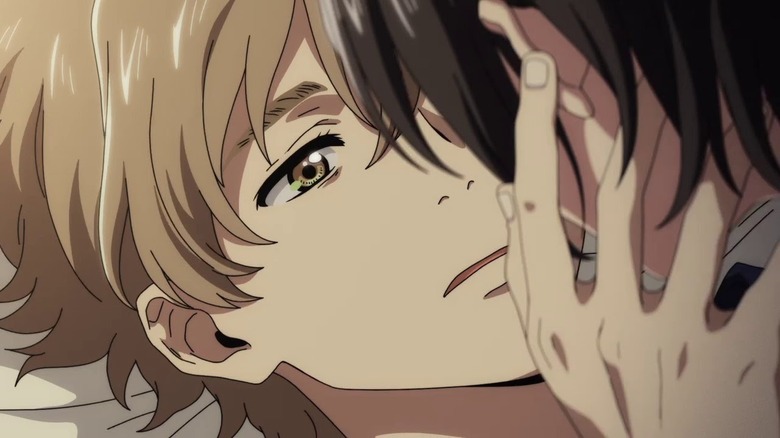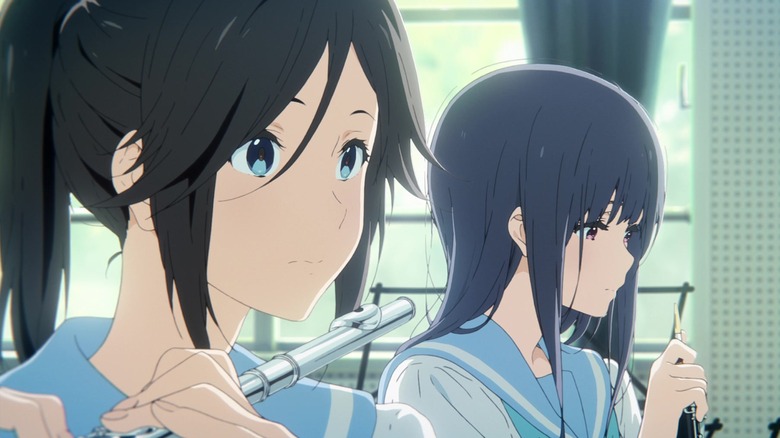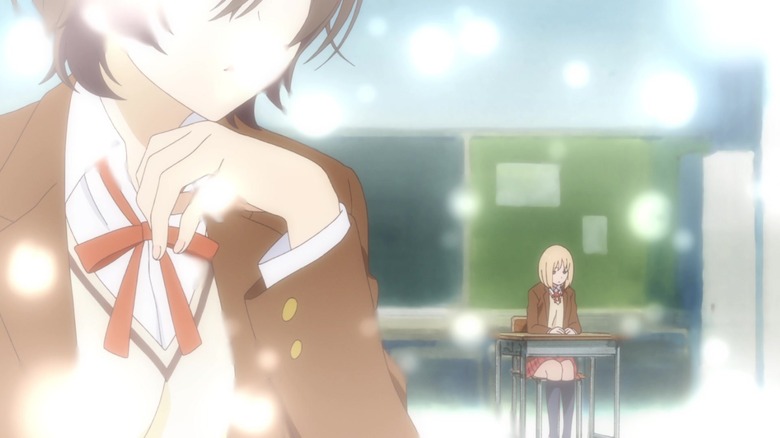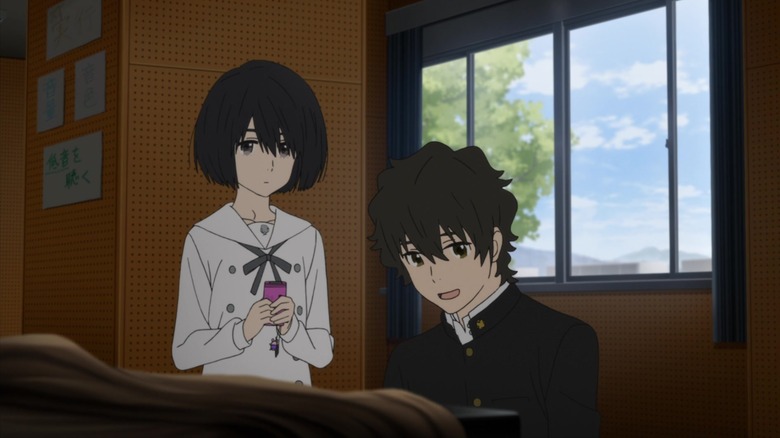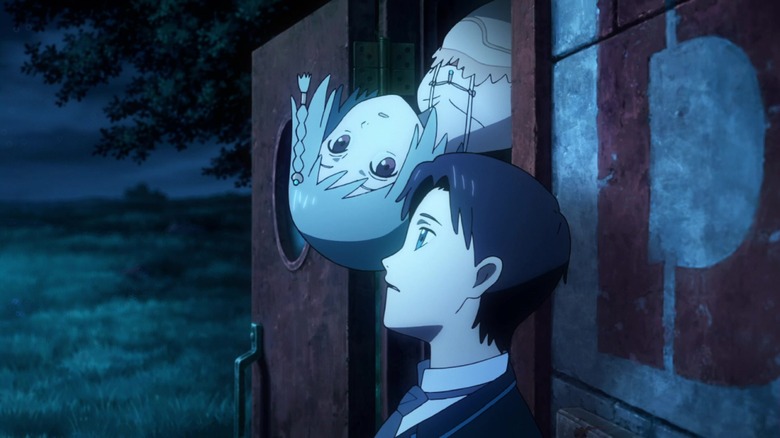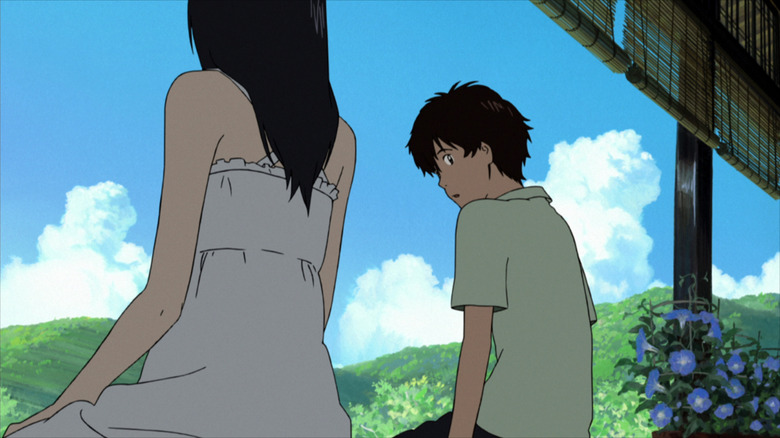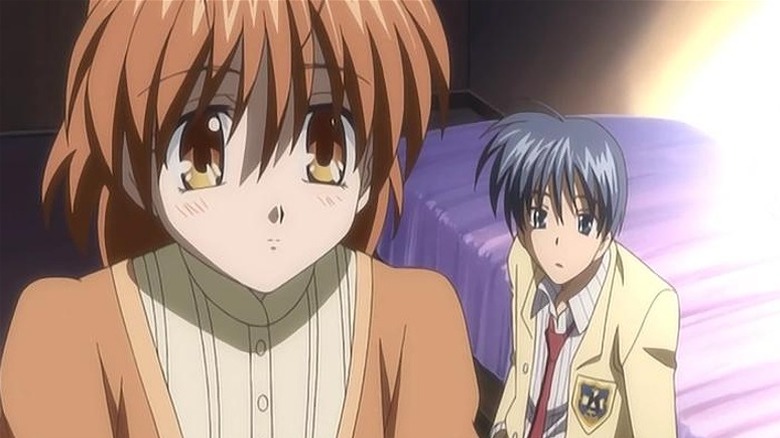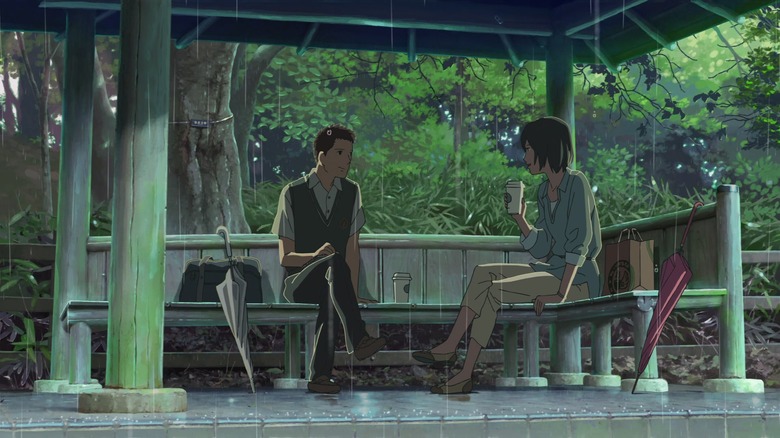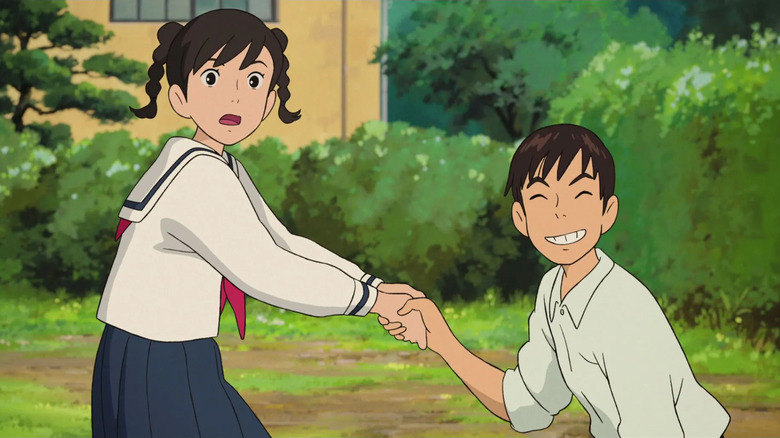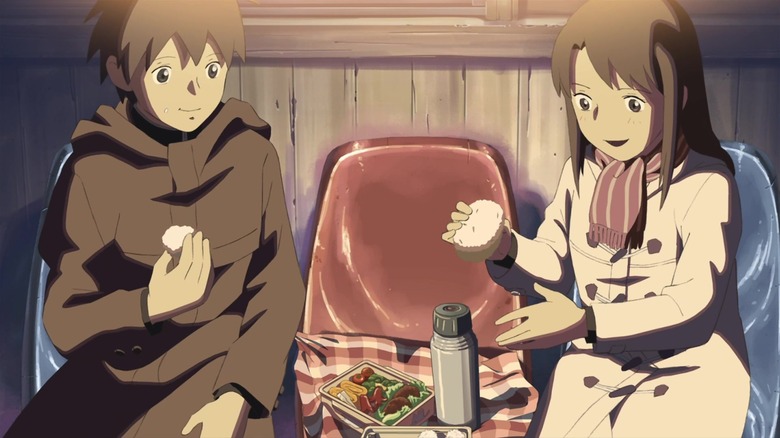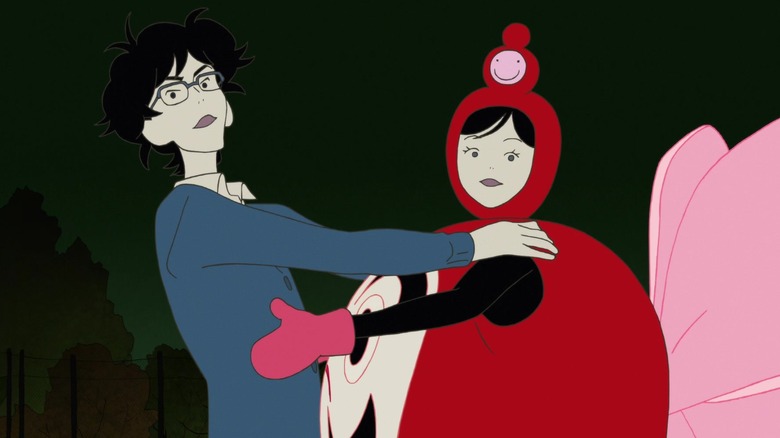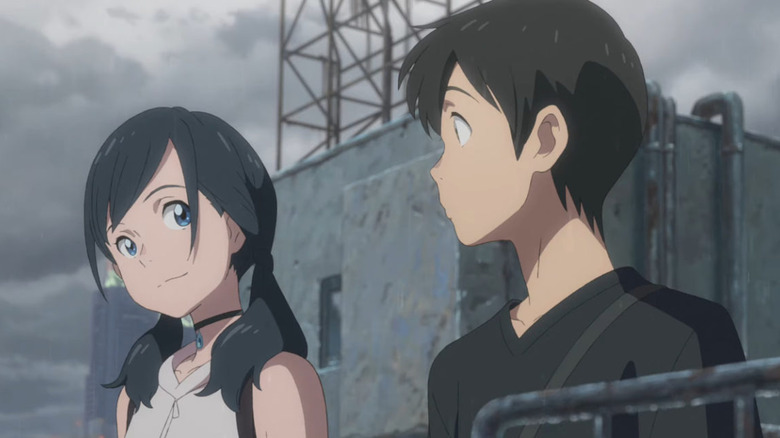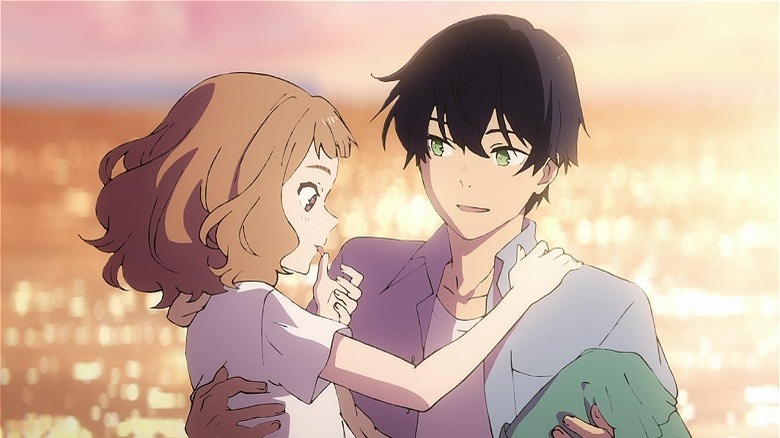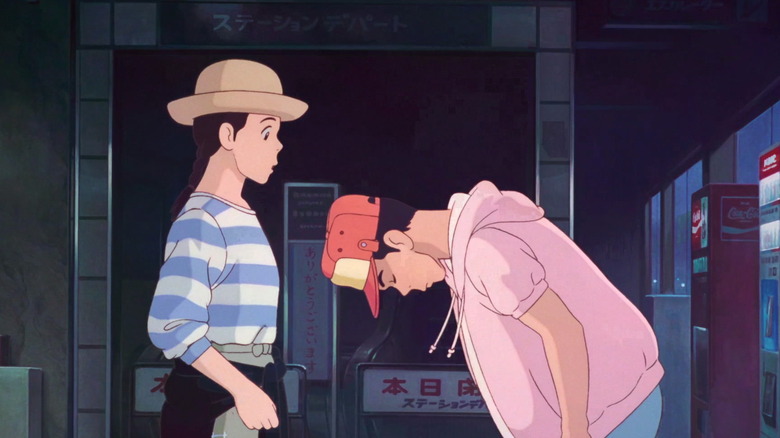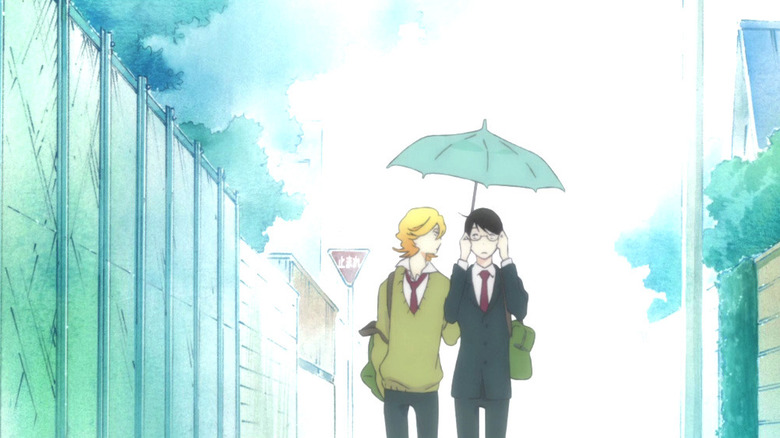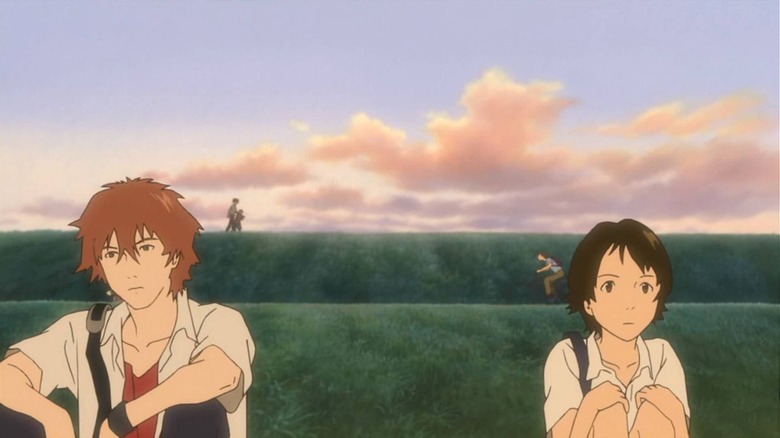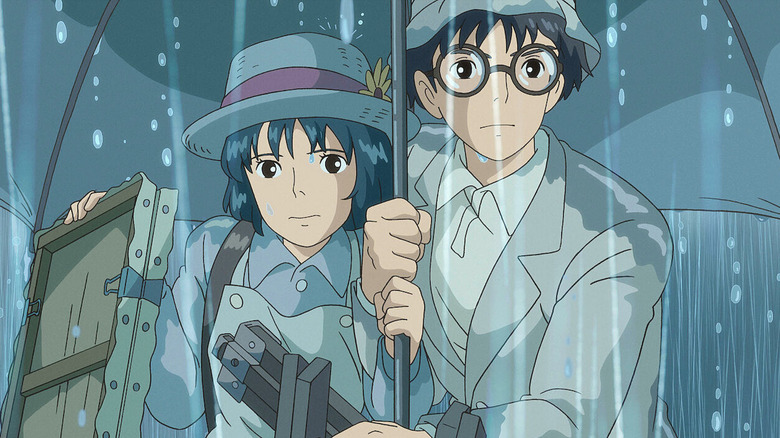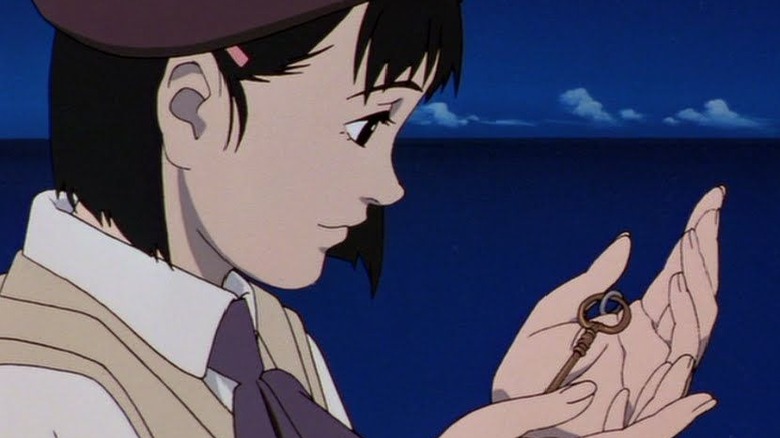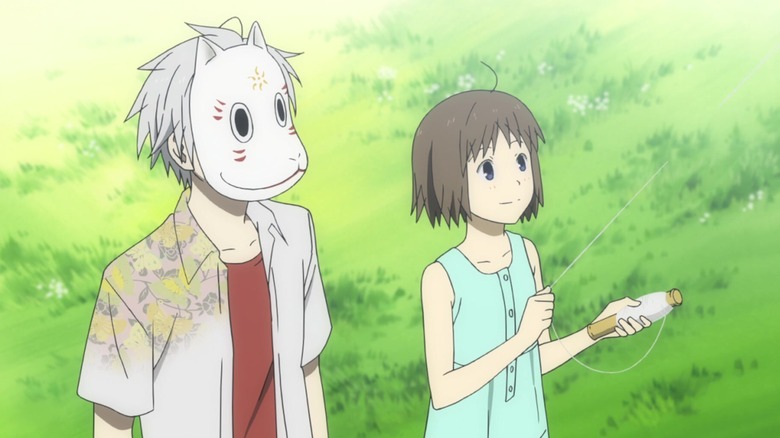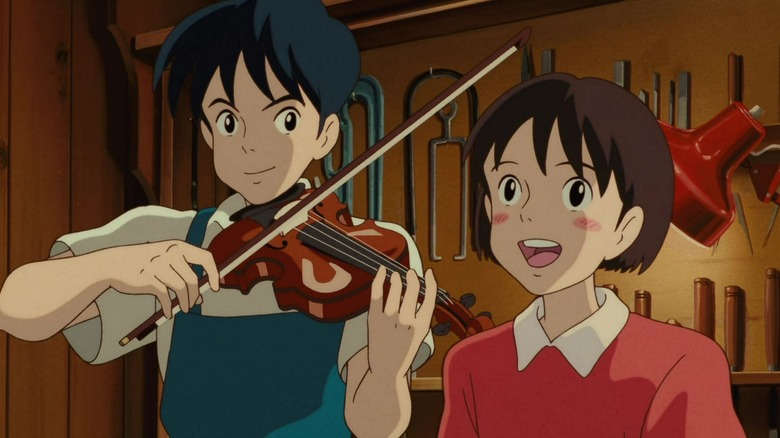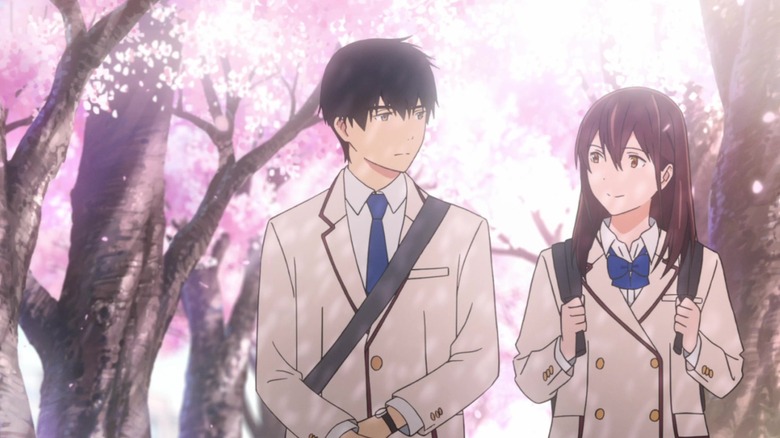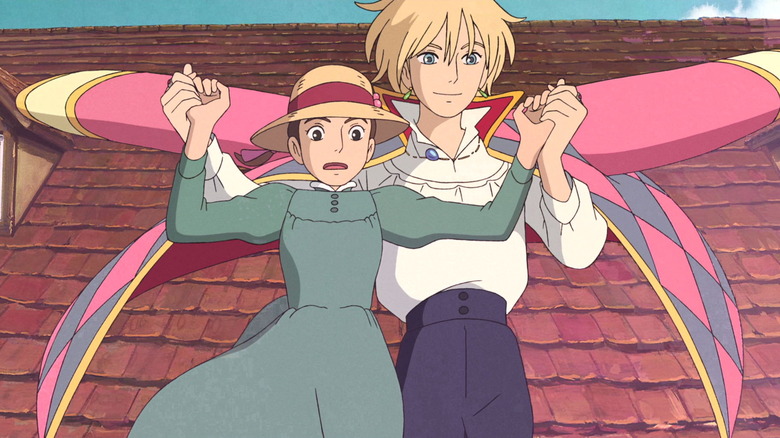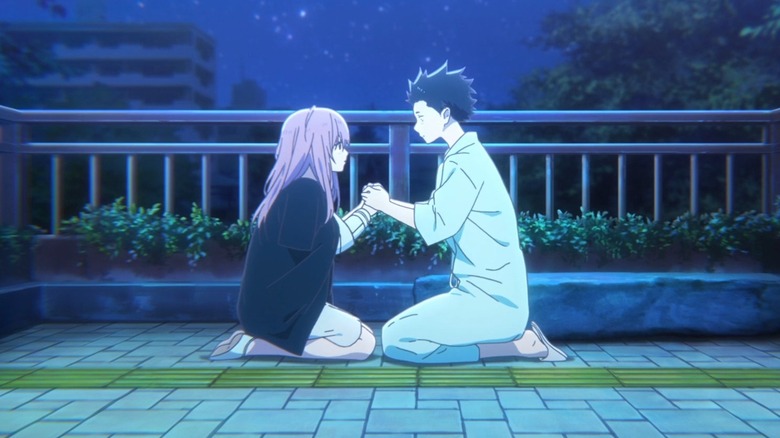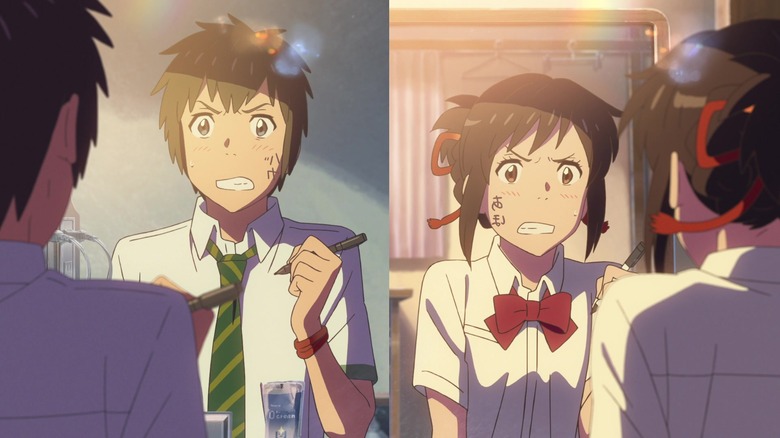35 Best Romantic Anime Movies Ranked According To IMDb
Fans will be well aware of the rich diversity that anime offers, but others might not realize that there's a wealth of anime sub-genres that come under the umbrella of this animation style. In addition to the futuristic sci-fi and more action-packed offerings, a lot of anime is more focused on tugging at the heartstrings and exploring the intricacies of love and romance.
There is something about the power of anime that helps it to emotionally resonate with its audience — and this is particularly evident in romantic anime. The strongest films in this sub-genre really nail the building, maintaining, and sometimes ending of relationships, effectively conveying the deep bonds in both romantic and platonic relationships. While the focus is often on young love, that shouldn't discount the effectiveness of the way romantic anime handles the complex feelings and emotions we all feel — often resulting in an experience that feels deeply personal and relatable. Whether you're a huge anime fan already or you're an anime newbie looking for the place to start, we've ranked 35 of the best romantic anime movies according to their scores on IMDb.
35. Fireworks (2017)
While the usual pattern is to have the anime come first and the live-action remake later, 2017's "Fireworks" turns that on its head as it is a remake of the 1993 live-action film of the same name. This makes it pretty unique among anime movies — the vast majority of which are either completely original stories or are adapted from some other source such as manga, video games, or traditional folklore.
Critics were initially lukewarm on it, but it was a hit with audiences and was later nominated for both a Japan Academy Film Prize Award and a Crunchyroll Anime Award. "Fireworks" tells the story of a boy named Norimichi (Masaki Suda) who finds a ball that allows him to turn back time and redo past decisions — however, he ultimately learns that each attempt to redo a mistake just leads to a whole bunch of new problems. Along the way, he attempts to connect with his classmate Nazuna (Suzu Hirose). But this is complicated by another boy named Yusuke (Mamoru Miyano), who also has feelings for Nazuna and isn't willing to let her go without a fight.
Through its love triangle dynamic, "Fireworks" offers a great representation of the missteps that teenagers make as they try to form a bond with another person for the first time — while they're also still trying to figure out who they are themselves.
34. I've Always Liked You (2016)
Romantic anime movies aren't completely immune to the familiar rom-com tropes, and "I've Always Liked You" is built on the type of silly misunderstanding that forms the basis of so many of the movies we know and love. High school student Natsuki (Haruka Tomatsu) has had feelings for her friend, Yu (Hiroshi Kamiya), for a long time and has been trying to muster up the courage to tell him so. She finally gets it out one day, but immediately backpedals and tells Yu that she was actually just practicing how she'd confess her feelings for a guy she truly did like. So Yu — being a good and loyal friend — decides to help Natsuki find that guy, not realizing it's actually him.
The perhaps unsurprising twist in this story is that Yu feels the same way, but he also struggles with sharing his feelings and keeps them to himself — something that is further repressed when he thinks Natsuki likes someone else. While all of this is going on, another boy at the school — Koyuki (Tsubasa Yonaga) — also has feelings for Natsuki and is trying to summon his own confession courage. It all admittedly sounds a bit corny and the story beats are rarely surprising, but "I've Always Liked You" is an incredibly sweet and funny film that overcomes its clichés with sharp writing and great characters.
33. Ocean Waves (1993)
"Ocean Waves" is a unique effort from Studio Ghibli in that it was a made-for-television film that aired on Nippon TV. It was something of a trial run for the then-younger generation of Studio Ghibli and its collaborators, seeing what they could do without the guiding hand of Hayao Miyazaki or Isao Takahata and with the limited budget of a small-screen production. The results do lack some of the visual splendor and the impeccable polish of a typical Ghibli work, but "Ocean Waves" is still more than worthy of the studio's legacy.
The story follows two high school boys — Taku (Nobuo Tobita) and Yutaka (Toshihiko Seki) — who both become interested in Rikako (Yoko Sakamoto) and have to navigate the way that complicates their friendship. Fortunately, what seems like a tale that's been told a million times is still made fresh by its well-formed characters, sharp writing, and the way the story doesn't go in the obvious directions — particularly how its version of a "happily ever after" isn't necessarily what you might expect.
It's hard to say whether it would've been a better movie if it had been given the full Ghibli treatment and budget, but for what it's worth, what "Ocean Waves" does end up being is something wholly special, in part because it's not typical Ghibli.
32. Hello World (2019)
"Hello World" takes place in a near-future Kyoto and is about two introverted teenagers who bond over their love of reading, but whose shyness has prevented them from taking their friendship to the next level. One of them, Naomi (Takumi Kitamura), is visited by his 10-years-in-the-future self (voiced by Tori Matsuzaka) to warn him that something tragic befalls the girl, Ruri (Minami Hamabe), shortly after their romance finally begins. Future Naomi and present-day Naomi begin planning ways to prevent the tragedy and change the future, while also helping to progress his romance with Ruri.
The best time travel movies often have a romance at the center — and more specifically, one where time travel must be used to prevent something bad from happening to someone's partner. But the way this is tackled in "Hello World" — with the present and future versions of Naomi working together — is unique, and the plot goes in a lot of interesting and unusual directions toward its surprising conclusion. For fans of hybrid sci-fi and romance stories, "Hello World" is well worth a watch.
31. Hal (2013)
"Hal" was the first full-length film to come out of Wit Studio, the company behind the wildly popular anime adaptation of the dark fantasy manga "Attack on Titan." The film gave the studio the chance to prove they're every bit as capable of tackling the sci-fi genre. The story imagines a technologically advanced world where humanoid robots have been integrated into society as humanity's helpers. After the loss of her boyfriend to a terrible mid-air plane explosion, Kurumi (Yōko Hikasa) is plunged into a deep state of depression, unable to even sleep or eat — let alone smile. To bring her back from despair, a robot (Yoshimasa Hosoya) is given Hal's appearance and sent to her aid.
Told from the perspective of Hal, this movie is an emotional look at love from the end of the story through the lens of grief. The film's sci-fi elements lend a fantastical atmosphere to the storytelling, but they aren't integral to the tale, which is more about the psychological aspects of loss after love. A dramatic and deftly pulled-off plot twist shows just how deep that kind of grief can go. At only an hour long, "Hal" is a bit on the shorter side.
30. A Whisker Away (2020)
In "A Whisker Away," a young girl named Miyo (Mirai Shida) is crushing hard on a boy named Kento (Natsuki Hanae) and tries her best to woo him even as he rebuffs her at every turn. One day, Miyo discovers a mask that allows her to transform into a cat — and naturally, one of the first things she does is approach Kento in her cat form. Kento quickly bonds with the cat, and in this way, Miyo is able to spend time with Kento and get the affection she always wanted from him. However, Kento doesn't know Miyo is the cat, and Miyo wants to have a real, human relationship with Kento. So she needs to decide if it's worth the risk of revealing the truth to him, with the possibility that he'll not only reject her again but also not want to spend time with her as a cat anymore.
It's an extremely sweet story — one that definitely skews a little younger — but that doesn't mean that adults won't be charmed by it as well. In fact, adults probably understand better than kids do just how strong of a bond people can develop with animals, and how sometimes it's easier to open up to animals as they don't judge you and their affection is much more unconditional. "A Whisker Away" feels like a Studio Ghibli film in a lot of ways, and that's definitely intended to be a huge compliment.
29. Ride Your Wave (2019)
Directed by Masaaki Yuasa — who also directed "The Night is Short, Walk on Girl" — 2019's "Ride Your Wave" proves that he is able to apply his highly visual and reality-stretching approach to storytelling to a more traditional — and arguably more mainstream — love story.
That being said, there are still some fantastical and unique elements to "Ride Your Wave" that make it anything but ordinary. Hinako (Rina Kawaei) is a surfer girl who begins dating handsome firefighter Minato (Ryota Katayose). However, their happiness is short-lived after Minato dies rescuing a jetskier — only to discover that he is seemingly able to live on but exclusively underwater. Revealing himself every time Hinako sings the song they used to sing together, Minato remains part of her life, but eventually, they might have to learn to let each other go.
While still a fantasy, "Ride Your Wave" has a realistic approach to romance, giving it a slight edge over Yuasa's other films and making it one of the best romantic movies in recent memory — anime or otherwise.
28. Words Bubble Up Like Soda Pop (2021)
While a lot of romantic movies are about the beginning of a presumably long-lasting relationship, many just tell the story of a single, magical summer — and that's the approach that "Words Bubble Up Like Soda Pop" takes. The story follows a shy boy nicknamed Cherry (Ichikawa Somegoro) — who only knows how to properly express himself via haiku — and a girl who calls herself Smile (Hana Sugisaki) who is trying to be an online personality spreading a message of positivity but wears a mask because she's self-conscious about her teeth.
Cherry and Smile find themselves working at the same elderly care facility one summer and bond over trying to help Fujiyama (Koichi Yamadera) — one of the people at the facility — to try and find a specific record at the vintage music shop he owns. The two, along with some friends, go on a journey full of music and self-discovery, learning to overcome their respective insecurities. It's an incredibly charming film that paints a wonderful portrait of those magical summers when people share a deeply meaningful, if ultimately fleeting, connection with another person that changes them forever.
27. The Place Promised in Our Early Days (2004)
"The Place Promised in Our Early Days" was the first feature-length film written and directed by Makoto Shinkai, who would quickly make a name for himself in the romance anime movie genre with his subsequent projects. He may be the most prolific filmmaker currently working in this particular genre — and he seems to only just be getting started.
Here, Shinkai tells a story set in an alternate post-war Japan that follows three teenagers — Hiroki (Hidetaka Yoshioka), Takuya (Masato Hagiwara), and Sayuri (Yūka Nanri) — as they try to build an airplane that'll allow them to visit a mysterious tower. Hiroki and Takuya both have feelings for Sayuri, but in a refreshing twist, there isn't a competition or rivalry between the boys for Sayuri's affection. The three of them make peace with their complicated situation and largely put it aside so they can all remain friends — not to mention focus on accomplishing the aforementioned task at hand which, of course, does not go off without some serious hitches. Beautifully animated, "The Place Promised in Our Early Days" is the perfect blend of romance and fantasy — a trend that has continued throughout Shinkai's films.
26. Tamako Love Story (2014)
In the mundane of the adult world, it's easy to forget the drama and big feelings of dealing with the overwhelming emotions of young love for the first time. When that love is unspoken or unrequited, those feelings can be heavy and consuming. Exploring the process by which young souls move through those difficult days is the preoccupation of "Tamako Love Story," a follow-up film to the anime series "Tamako Market."
The film follows Tamako (Aya Suzaki) and her Baton Club friends from the series, all now high school seniors looking toward the next stage of their lives. When Mochizō (Atsushi Tamaru) decides to tell his best friend from childhood Tamako that he's in love with her, the homeostasis of their little world is thrown askew as she begins to explore her own feelings toward the friend she's known all her life. A pretty straightforward film about the beauty and pain of first love, this film is more about feelings than plot — but fans say that's perfectly fine with them.
Praising the natural way the friendship between these two friends evolves into love, IMDb user Frank_Strk wrote, "An incredible work by Japanese animation, which shows the flowering of an innocent love between two childhood friends."
25. Promare (2019)
"Promare" is a big, over-the-top action movie first (in fact, it's one of the best action movies streaming right now), a sci-fi allegory for resisting oppression second, and a romance third — but that romance is so great it had to make this list. Some viewers have tried to deny that the relationship between firefighter Galo Thymos (Ken'ichi Matsuyama) and "Burnish" fire-starter Lio Fotia (Taichi Saotome) is a romantic one, saying that their big climactic kiss is just magic CPR despite being framed like a "Snow White"-style kiss of life. American distributor GKIDS categorizing "Promare" as a Valentine's Day movie seems like a clear enough signal that those viewers are wrong — on top of, you know, the whole rest of the movie.
Over the course of the film, Galo and Lio go from enemies fighting each other to partners co-piloting giant robots named after themselves ("Lio de Galon" and "Galo de Lion") as they fight to liberate the Burnish. Their chemistry is off the charts, and the love songs on Hiroyuki Sawano's soundtrack further voice these heroes' feelings for one another. Also, Lio keeps losing pieces of clothing until he ends the movie shirtless, becoming more like the always shirtless Galo. No wonder shippers went crazy for "Promare."
24. The Stranger by the Shore (2020)
While BL (boys' love) and yuri (girls' love) manga fill store shelves, anime feature films in those genres are much rarer — and many of the ones that do get made often barely qualify as feature-length. "The Stranger by the Shore" is one of three queer romance films on this list that runs for around an hour, and the restraints of its runtime are likely a major reason IMDb users don't rank it higher. Compared to the original manga by Kanna Kii (published Stateside under the title "Seaside Stranger"), Akiyo Ohashi's adaptation feels underdeveloped and awkwardly paced in places.
However, despite its faults, "The Stranger by the Shore" stands out in terms of gay representation. It follows novelist Shun Hashimoto (Taishi Murata), who has struggled with homophobia throughout his life. When his younger admirer Mio Chibana (Yoshitsugu Matsuoka) returns to Okinawa to confess his love, Shun fears he'll be holding Mio back from a "normal" life. Ultimately, Shun and Mio do end up together. The sex scene between the two of them is one of the most intense you'll see in any non-hentai film and one of the most sensitively handled in any anime.
23. Liz and the Blue Bird (2018)
One doesn't necessarily have to view "Liz and the Blue Bird" as a gay romance — but it's very easy to read it as such. Asked about queer readings of the film by Anime News Network, director Naoko Yamada (who also made "Tamako Love Story" and "A Silent Voice") has said that it "wasn't so much the representation of one sexual orientation, but it was a representation of adolescence, what the characters tend to go through at that time." So maybe you could see it just as a story of an intense friendship, but when the emotions are depicted this intensely, it's indistinguishable from romance.
"Liz and the Blue Bird" is a spin-off of the hit music-themed series "Sound! Euphonium," centering on side characters from the main show — shy oboist Mizore Yoroizuka (Atsumi Tanezaki) and popular flutist Nozomi Kasaki (Nao Toyama) — and completely accessible as a stand-alone film. As they approach graduation, Mizore fears she and Nozomi will grow apart when all she wants is to stay with her forever. Their story parallels a fairy tale that inspired the musical piece Mizore and Nozomi practice together. Gorgeous animation and classical music heighten the bittersweet feeling that this film triggers.
22. Kase-san and Morning Glories (2018)
Hiromi Takashima's "Kase-san" yuri manga had its first animated adaptation with a six-minute animated short from director Takuya Sato and animation studio ZEXCS released online in 2017. Fans wanted more after that tease, and once the short surpassed 100,000 views, Sato and ZEXCS announced a full hour-long "Kase-san and Morning Glories" movie set for release the following year.
"Kase-san and Morning Glories" centers around Yui Yamada (Minami Takahashi), a shy and clumsy high school girl with two great loves: gardening, and her athletic tomboy classmate Tomoka Kase (Ayane Sakura). Adapting stories from the second and third volumes of the manga, the film starts with Yamada and Kase already dating, so the focus isn't "will they or won't they" but rather how they can make their relationship work. Newcomers might wish to read the manga to get the full story, but it's not a requirement for enjoying the adaptation, which is utterly adorable and one of the most wholesome sapphic anime out there (if you like this, here are our recommendations for more great lesbian romance movies).
21. The Anthem of the Heart (2015)
"The Anthem of the Heart" focuses on a girl named Jun (Inori Minase), who unknowingly exposes her father's affair and is subsequently blamed for the damage that the revelation does to the family. Not knowing any better, she comes to believe that it truly was her words that caused so much pain and ends up essentially wishing a magical curse on herself that renders her unable to talk — which she believes is best for everyone. But is the curse real, or is it just her way of excusing herself from talking and not risking having to hurt anyone with her words ever again?
Jun goes on a journey of self-discovery that helps her to forgive and grant herself permission to speak again, aided by her newfound love of music and a budding friendship with a classmate named Takumi (Kōki Uchiyama). It's the kind of beautiful story that wouldn't have been as effectively told in any other medium, best summarized by Zac Bertschy for Anime News Network who said, "Every now and then you've got to stop and recognize the truly unique things about anime that are still true — like the fact that it tells stories with animation that no one else does."
20. Patema Inverted (2013)
In a similar vein to the Upside Down in "Stranger Things," 2013's "Patema Inverted" plays with the idea of a real and alternate world. Patema (Yukiyo Fujii) is a girl who comes from an underground civilization and finds herself on the surface — where gravity is reversed from what she knows. She immediately begins to fall into the sky before being rescued by surface-dweller Eiji (Nobuhiko Okamoto). Eiji helps Patema stay grounded, despite his society teaching him that the people from her world are evil and that the sky "swallows" them as punishment for their sins.
It's the familiar "Romeo and Juliet" trope — two lovers who are part of warring sides — but told in a genuinely unique way. As well as the narrow-minded views of those around them, gravity itself is trying to pull Patema and Eiji apart, and forcing them to find ways to overcome the obstacles that stand in the way of their budding relationship. "Patema Inverted" touches on classism and bigotry in really effective ways as it tells its heartwarming, sci-fi-tinged love story, and there are more than a few twists that you'll never see coming.
19. Summer Wars (2009)
The virtual world — and the unique form of escapism it offers — frequently crops up in film, television, and games — even spreading to the real world of fanciful billionaires like Facebook creator Mark Zuckerberg. Of course, it also appears in anime with shows like "Sword Art Online" and in the 2009 film "Summer Wars." In the film, society is infatuated with a virtual world called "OZ." One of OZ's moderators is a boy named Kenji (Ryunosuke Kamiki), a math whiz who is challenged by a stranger to solve a complicated puzzle. In successfully doing so, he inadvertently teaches the AI behind OZ the formula that will help it take over the real world.
While that serves as the primary conflict for "Summer Wars," there is also a romantic subplot involving a girl named Natsuki (Nanami Sakuraba) who has "hired" Kenji to accompany her to a family gathering and pose as her fiancé. The twist is Kenji already had a crush on Natsuki, so things get complicated quickly. While it might sound like a lot is going on here, "Summer Wars" is a fun, breezy, and easy-to-watch adventure. It was even named one of the best anime movies of all time by Empire, placed above such classics as "Princess Mononoke" and "Perfect Blue."
18. Clannad (2007)
Legendary anime writer and director Osamu Dezaki was part of the first generation of anime creators, starting out as an animator and episode director for the pioneering series "Astro Boy" in the '60s. His storied career also included work on franchises such as "Lupin the 3rd," "Golgo 13," "Hamtaro," and "Clannad" — the last of which would be his final film credit before his death in 2011. It was definitely a great way to cap off a hugely varied career, as the "Clannad" film is a bona fide anime classic.
While the "Clannad" franchise began as visual novel video games — and has since spun off into other films and series — the 2007 movie is arguably the cornerstone of the entire brand. It's the story of a high school boy named Tomoya (Kenji Nojima) who is going through the motions in school and life while generally feeling aimless. That is until he meets an intriguing girl named Nagisa (Mai Nakahara), who has expressed an interest in reviving the school's dormant drama club. Seizing his opportunity to impress her, Tomoyo decides to breathe some life into the club, and in doing so he also rekindles the fire of his own life and finally finds meaning in it again.
17. The Garden of Words (2013)
Takao (Miyu Irino) is a 15-year-old student and aspiring shoemaker who promises to make a pair of shoes for Yukari (Kana Hanazawa), a 27-year-old teacher. Although their rainy morning meet-ups are warm and friendly, they never exchange formal introductions and know relatively little about each other.
The two eventually find out the truth about one another and spend an afternoon together, at which point Takao tells Yukari he loves her. Pointing out their age difference and the fact that she's a teacher, she tells him they don't have a romantic future together. They part ways, but it is revealed that they keep in touch via email and eventually reunite several years later — with Takao finally giving Yukari the shoes he made for her.
Despite the age difference between the characters being problematic, "The Garden of Words" approaches this maturely, and while there are obvious romantic intentions from Takao, what we mostly see are two people connecting at a point in their lives when they need it the most.
16. From Up on Poppy Hill
"From Up on Poppy Hill" was the first direct collaboration between the legendary Hayao Miyazaki and his son, Goro Miyazaki. Hayao co-wrote the screenplay, and Goro directed the film, signifying a passing of the baton of sorts — although Hayao Miyazaki has come in and out of retirement many times since. Despite its positive critical reception, "From Up on Poppy Hill" remains one of the more underrated Studio Ghibli films, but it deserves more credit — particularly as a love story.
Two teens — Shun (Junichi Okada) and Umi (Masami Nagasawa) — are part of a group trying to prevent a beloved building from being demolished to make way for construction for the upcoming Olympics. The two quickly develop feelings for each other — particularly as Umi helps orphan Shun find out more about his past and his family — and the journey ends up connecting them in ways they never could've imagined. While it isn't on the same level as films like "Spirited Away," "From Up on Poppy Hill" is still an excellent film that a lot more people need to check out.
15. 5 Centimeters per Second (2007)
While it sits somewhere in the middle of Makoto Shinkai's work, quality-wise, being the middle child is nothing to be ashamed of for "5 Centimeters per Second" as it is still an exquisitely beautiful anime film. Following the theme of his other works, Shinkai once again addresses the highs and lows of long-distance relationships. Across three chapters, "5 Centimeters per Second" follows Takaki (Kenji Mizuhashi) and his relationships with two girls — Akari (voiced by Yoshimi Kondo and Ayaka Onouei) and Kanae (Satomi Hanamura).
While Kanae tries in vain to win Takaki's affection in the second chapter, his heart lies with Akari, but the former childhood sweethearts have drifted apart over the years and largely have to settle on memories and dreams of each other. Rather than accept the fact they won't be together and move on, both Takaki and Akari choose to live their lives forever pining for the one that got away. It's definitely not the happiest of love stories, but it's one that is no doubt familiar to many. Perhaps the highest praise it could've received came from Mark Shilling of The Japan Times, who proclaimed Shinkai as already having eclipsed Hayao Miyazaki in how he reveals the "poignant, evanescent beauty most of us notice only in rare moments."
14. The Night is Short, Walk on Girl (2017)
A lot of movies purport to take place within a single day or night, and it often feels like a stretch that so much could possibly happen in such a short time frame. In the case of the wildly inventive "The Night is Short, Walk on Girl," the concept of an impossibly long evening is deliberately subverted as this one night seems to go on for weeks.
The two leads of the movie are never named and are loosely referred to as "Senior" (Gen Hoshino) and "The Girl with Black Hair" (Kana Hanazawa). Senior has eyes on The Girl and tries to set it up so the two of them "accidentally" cross paths so he can talk to her, but one thing after another keeps getting in the way. While Senior tries to locate a book The Girl enjoyed as a child to eventually bring them together, The Girl is having a seriously wild night — punching a guy making unwelcome advances, and winning a drinking contest against a magical being.
"The Night is Short, Walk on Girl" does have a bit of "manic pixie dream girl" syndrome going on, but it embraces it to such an extreme that it doesn't feel like a trope here. This might be the most creatively ambitious film on this list and is one of a handful that absolutely would not work in any other medium except for anime.
13. Weathering with You (2019)
Perhaps inspired by "The Garden of Words," Makoto Shinkai revisits a budding love story during a rainy season in "Weathering with You." It focuses on a runaway named Hodaka (Kotaro Daigo) and an orphan girl named Hina (Nana Mori), both struggling with the seemingly never-ending rains that have been drenching Tokyo. After Hodaka helps Hina out of a dangerous situation, the two decide to run away together.
Later, Hodaka learns of Hina's power to make the sun shine and encourages her to use her power for good and to help people. But the terrible price of her power is eventually revealed, and the movie begins to move in a more magical direction that would be a shame to spoil here. All we'll say is that it's an incredible film, and at the heart of it is a wonderful and heartbreaking romance between Hodaka and Hina. It was a massive hit in Japan — making it into the top 15 of the country's all-time highest-grossing movies – as well as taking more than $193 million worldwide.
12. Josee, the Tiger and the Fish (2020)
"Josee, the Tiger and the Fish" is an intriguingly named anime film that sees a marine biology student named Tsuneo (Taishi Nakagawa) trying to scrape together enough money from various part-time jobs to study abroad. He soon finds himself crossing paths with a girl named Kumiko (Kaya Kiyohara) — though she prefers to be called "Josee" — who is wheelchair-bound and in need of a caretaker. Tsuneo is initially reluctant as he finds Josee abrasive and hard to get along with, but when he realizes that it's a great way for him to make some more cash, he agrees.
While it's rough going to begin with — and Tsuneo even considers quitting — he soon finds that he and Josee have a shared desire to travel and see the world. Their professional arrangement soon becomes a friendship and, eventually, a romance as the two realize that seeing the world together is what they truly want. "Josee, the Tiger and the Fish" is an achingly heartwarming story that, most crucially, never panders in terms of Josee's physical challenges. The way the film handles this is a tonic, and it makes it impossible not to fall in love with it.
11. Only Yesterday (1991)
Studio Ghibli's 1991 film "Only Yesterday" focuses on a city girl named Taeko (Miki Imai) who tires of the hustle and bustle of Tokyo and decides to visit her farming family in the country. Believing the fresh air and peace and quiet will do her some good, she reconnects with her relatives and gets to know more about them. While there, she also strikes up a friendship with her brother-in-law's farmer cousin named Toshio (Toshiro Yanagiba).
While we don't actually see a relationship between Taeko and Toshio officially begin over the course of the movie, the seeds are definitely being planted, and he no doubt ends up being a major factor in her ultimately deciding that she's ready to leave the city life behind permanently. With an English dub unavailable until the film's 25th anniversary, writer and director Isao Takahata lived just long enough to see "Only Yesterday" discovered by a whole new audience before he died in 2018.
10. Doukyusei: Classmates (2016)
Based on the BL manga by Asumiko Nakamura, the hour-long "Doukyusei: Classmates" movie is divided into four episodic chapters, following a romance at an all-boys high school over the course of the year. Anxious honors student Rihito Sajo (Kenji Nojima) and relaxed rock musician Hikaru Kusakabe (Hiroshi Kamiya) are a classic case of opposites attracting. Awkward flirtations lead to awkward kissing, which leads to declarations of first love — and to worries about whether such love can last beyond graduation.
The plot of "Classmates" isn't anything groundbreaking for its genre, and there are moments that fall into more problematic clichés, particularly the scenes with the music teacher Manabu Hara (Hideo Ishikawa) in the second chapter. But, despite these issues, the main characters' relationship is developed in heartwarming ways, and the visual style of the film, with its watercolor backgrounds and expressive character animation, heightens the emotional intimacy. Very few BL anime have been made with this level of artistic craft, justifying its relatively high rating on IMDb. Important note: This is not to be confused under any circumstances with the completely different "Dokyusei" dating sim and its hentai OVA adaptations.
9. The Girl Who Leapt Through Time (2006)
From Mamoru Hosoda — the same director as "Summer Wars" and 2018's Oscar-nominated "Mirai" — "The Girl Who Leapt Through Time" is a highly imaginative romantic comedy-drama that establishes Hosoda as a force to be reckoned with in the anime world. The story focuses on Makoto (Riisa Naka), who finds herself with the ability to time travel. As most 17-year-olds would, she initially uses it for frivolous reasons like retaking failed tests at school and reliving fun evenings over and over again. However, she soon realizes that every time she alters the past for her own benefit, it ends up leading to negative consequences for others.
Forced to wrestle with the idea that her powers can do more harm than good, things come to a head when Makoto starts using her time jump ability to prevent her friend Chiaki (Takuya Ishida) from confessing his love for her — leaving the two becoming entangled in ways they never expected. "The Girl Who Leapt Through Time" is a really inventive love story, and as well as one of the best anime films, it also deserves to be in the discussion of all-time great time travel movies.
8. The Wind Rises (2013)
Seeing Hayao Miyazaki's name on a Studio Ghibli film is an instant mark of quality, and "The Wind Rises" is among the ones he both wrote and directed. But what makes "The Wind Rises" unique is that it's actually something of a biopic about several real-life engineers and aircraft designers who helped to create some of the aircraft that the Imperial Navy and other military forces used during World War II.
While it finds inspiration in truth, it is a very fictionalized account of the lives and work of Jiro Horikoshi, Kiro Honjo, and Giovanni Battista Caproni (voiced by Hideaki Anno, Hidetoshi Nishijima, and Nomura Mansai respectively) and it takes a lot of liberties for the sake of telling a compelling story. Perhaps the most significant of these is the fabrication of a woman named Naoko Satomi (Miori Takimoto), who ends up as the wife of Jiro in the movie, and their romance becomes one of the driving forces of the entire film.
Essentially, it's a fictional love story that loosely borrows some real-life names and events as a backdrop, but it's an incredibly endearing one. It's a formula that many movies try, but with "The Wind Rises" also utilizing Miyazaki's much-publicized love of planes and flight, the results are enchanting.
7. Millennium Actress (2001)
Of all the films on this list, "Millennium Actress" is the one that probably stretches the definition of romance anime the furthest. In some ways, the love story of the movie encompasses visionary filmmaker Satoshi Kon's love of cinema – using the framework of a retired actress reliving her storied career to move through the various eras of Japanese film history. Like most Kon movies, fantasy and reality are soon blurred, and Chiyoko (the actress, voiced by Mami Koyama) is somehow also relaying parts of her career that took place not only in ancient Japan but also in the future.
In addition, there is an underlying story of unrequited love between Chiyoko and an anti-war artist she met briefly as a teenager who gave her a mysterious key that she has held onto for her entire life. Because it is a Kon movie, there are layers upon layers of meaning in every scene of "Millennium Actress." He was never going to make a traditional romance movie, and this is the closest he was ever going to get — managing to be both exactly what you would expect, and completely unexpected at the same time.
6. To the Forest of Firefly Lights (2011)
With Hotaru (Ayane Sakura) — the female lead of "To the Forest of Firefly Lights" — being only 6 years old at the start of the film, it might seem unusual to call it a "romance" movie. But the truth is, some people do start feeling genuine connections with others at that age — even if that connection is entirely innocent and platonic. The way this film approaches this is actually very sweet, and it can be argued that it would be hard to do it as effectively in any other medium besides anime.
The boy Hotaru connects with, Gin (Koki Uchiyama), has a curse on him that prevents him from making physical contact with another human being. Doomed to disappear if he does make contact, Gin and Hotaru spend time together and enjoy each other's company without any need for physicality. Of course, as the years go by and they get older, that becomes more difficult and less realistic, and the pair have to see if their relationship has a future despite this major barrier. "To the Forest of Firefly Lights" is ultimately a bittersweet but beautifully told tale of waiting and longing that you'll be thinking about long after it's over.
5. Whisper of the Heart (1995)
Despite there being a lot of general romanticism in many Studio Ghibli movies, the company actually doesn't tell traditional love stories very often. One of the few that is more-or-less a straightforward romantic drama is "Whisper of the Heart." The film was written by Hayao Miyazaki but directed by Yoshifumi Kondo, who was primed to transition into being the new creative head of the studio once Miyazaki and Isao Takahata retired. Sadly, he would never get the chance as he passed away three years after the release of "Whisper of the Heart."
The film follows a book-obsessed young girl named Shizuku (Yoko Honna) who begins to notice that every book she borrows from the library has previously been read by someone named Seiji Amasawa (Issei Takahashi). She decides to look for the boy, certain that the two will have a lot in common. But the journey ends up taking some surprising turns that involve a giant, talking cat person — it is still a Studio Ghibli movie, after all. So beloved is "Whisper of the Heart" that it spawned the only direct spin-off movie Ghibli has done so far with "The Cat Returns" in 2002.
4. I Want to Eat Your Pancreas (2018)
To address the elephant in the room immediately, the title of this movie is certainly an attention-grabber, and it doesn't immediately strike you as being romantic in nature. While it's easy to make all kinds of wild assumptions about an anime with such a title, it is so named for an extremely heartbreaking reason. "I Want to Eat Your Pancreas" focuses on a high school girl, Sakura (Lynn), who is suffering from a terminal pancreatic illness. She meets a new friend (Mahiro Takasugi) — who goes unnamed for most of the movie — and loves that he doesn't pity her or act sad around her. Instead, he just wants to enjoy her company as if she wasn't dying.
The two spend her remaining days together, and we watch them do the best they can do to act as if they are just two normal teenagers hanging out and falling in love. The sadness that underpins their time together is obviously impossible to completely put out of your mind as you watch, but you'll be surprised just how much you're willing to go along with it and enjoy them relishing each moment they have together. Writing for Starburst Magazine, James Perkins said it best when he said that the movie is "devastatingly beautiful" and a "gut-punch of a romantic drama." You have been warned: you'll need to have an entire box of tissues ready for this one.
3. Howl's Moving Castle (2004)
Hayao Miyazaki is a reclusive man who likes to bury himself in his work, and he doesn't give a lot of interviews or talk at great length about his films. So when he let slip that his favorite movie that he ever worked on is "Howl's Moving Castle," it's a declaration that should not be taken lightly as he is obviously very careful about what he shares with the world.
Needless to say, you can ask 10 different people their favorite Studio Ghibli movie and get 10 equally valid answers, but "Howl's Moving Castle" makes a strong case for being the company's best love story. It echoes "The Wizard of Oz" in several obvious ways — including having a character known as the Witch of the Waste — but in this case, the wizard (Howl, voiced by Takuya Kimura) actually does have magic powers, isn't cruel, and ends up romantically entangled with the movie's Dorothy stand-in (Sophie, voiced by Chieko Baisho). The two go on a magical journey accompanied by other pals — including the scarecrow-esque Turnip Head (Yo Oizumi) — as they try to break Sophie of the curse that has transformed her into a 90-year-old woman. Proving to be a hit with audiences and critics, "Howl's Moving Castle" earned Miyazaki an Academy Award nomination for best animated feature film.
2. A Silent Voice (2016)
The shiniest of hidden gems, "A Silent Voice" is about a boy named Shoya (Miyu Irino) who quickly begins to tease Shoko (Saori Hayami) — a deaf transfer student — which encourages most of their classmates to join in. However, when Shoko's mother confronts the school about her daughter being bullied, Shoya is thrown under the bus and becomes the scapegoat for all of the torment that Shoko has received. Things get even worse after Shoko moves on to a different school, as the student body continues to shun Shoya in lieu of taking any responsibility for their own cruelty.
Years later, a high school-age Shoya remains internally tormented for how he treated Shoko and tries to find her in order to make amends. What started as a simple attempt to provide closure for himself and healing for Shoko takes a surprising turn when a romance blossoms between the two. Beyond "A Silent Voice" addressing bullying in a powerful and realistic way, it also tells one of the most well-written and fully-formed love stories in the history of anime.
1. Your Name (2016)
We doubt anyone would be surprised to see "Your Name" at the top of this list. Not only is it Makoto Shinkai's best movie, and one of the best anime movies of all time, but it's one of the biggest movies in Japanese history, making more than $357 million at the box office.
It would be just as easy to list all the accolades "Your Name" has received and records it has broken, but none of that gets to the heart of why it is the best romantic anime movie ever. It's the story of two high schoolers — a country girl named Mitsuha (Mone Kamishiraishi) who dreams of being a city boy, and a boy named Taki (Ryunosuke Kamiki) who lives in Tokyo. When they wake up one morning to find they have swapped bodies and lives, they try to find each other while also attempting to deal with the strange occurrence. Romance tinged with fantasy is what Makoto Shinkai does best, and "Your Name" feels like the realization of all the ideas demonstrated in his previous features and shorts.
It is an undeniably ambitious premise — and one that could have so easily failed — but "Your Name" completely exceeds all expectations. It's easy to write off a movie this beloved and highly acclaimed as "overrated," but "Your Name" deserves every ounce of praise it has had heaped upon it.
